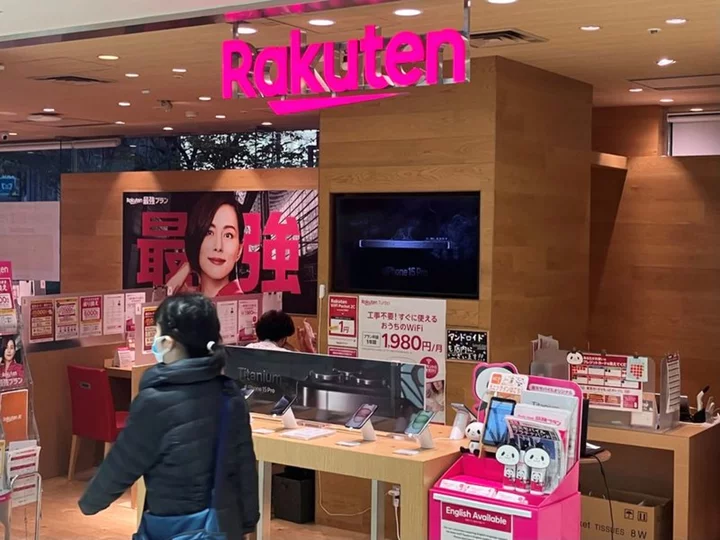By Anton Bridge
TOKYO When Japan's Rakuten launched a mobile service network in 2020, the e-commerce and fintech giant promised to disrupt the world's third-largest telecoms market. It's done that in part, but the greater shake-up has been to its finances.
By any measure, cash-bleeding Rakuten Mobile is deeply troubled.
Founder and CEO Hiroshi "Mickey" Mikitani's initial vision of a low-cost network using cloud-based software and cheap hardware did not pan out as infrastructure costs spiralled. A too-quick rollout earned Rakuten a reputation for spotty coverage it is still trying to repair.
The damage to its parent company has been significant - 13 straight quarters of operating losses amounting to roughly $5.5 billion and a huge amount of debt - $5.4 billion of which is due in the next two years.
Rakuten is set for another tough year in 2024 with investors keen to see if it can achieve its goal of having the mobile unit break even. It's an onerous target that assumes jumps in both subscriber numbers and average revenue per user (ARPU) at a time when rivals are on the attack with competitive pricing and reward campaigns.
Rakuten also needs to refinance its debt - action the company has said it will take while also flagging more "equity-related financing" to reduce its debt burden.
"The company can't afford to put a foot wrong," said Citi analyst Mitsunobu Tsuruo.
"If there's a recession or some kind of tightening of credit markets, then that could represent a big risk to Rakuten."
Rakuten said in a statement to Reuters it was well placed to achieve its 2024 goals and that the mobile unit has a clear path to profitability, citing recent accelerated subscriber growth.
Analysts say Rakuten has only withstood the damage so far because its other businesses are so robust. Its core e-commerce business vies with Amazon Japan for the title of Japan's top e-commerce site, while many of its online financial services units have steadily increased profits.
Even so, to shore up its finances, Rakuten has since 2021 issued new shares to strategic investors and the public, twice sold down its holding in Rakuten Securities, listed Rakuten Bank and offloaded other assets.
Those steps have raised some 800 billion yen ($5.4 billion). Plans for Rakuten Securities to go public have, however, been postponed after rival SBI Securities began offering clients stock trading with zero commissions.
Analysts now predict a listing of Rakuten Card is in the offing. The unit - which includes the group's points and payments system - is at the heart of Rakuten's ecosystem. The points programme woos its e-commerce customers to other services. Points can then be used to pay bills, book travel or buy groceries.
RIVALS GUNNING FOR IT
The advent of Rakuten Mobile helped push down subscriber fees across Japan's telecom industry but almost four years after its launch, the business only has market share of around 2.5%.
Rakuten's published break-even scenario for the unit calls for subscribers to climb to 8-10 million from 5.2 million at the end of September. In the most recent quarter, subscribers grew by around 400,000. At that rate, it would take well into 2026 - after the bulk of its bond redemptions are due - for Rakuten to reach the lower end of its target.
In its statement to Reuters, Rakuten noted it had net subscriber growth of 192,000 in October, a monthly level that if maintained would mean it could reach 8 million subscribers by December 2024.
Rakuten's break-even scenario also calls for ARPU to rise to between 2,500 and 3,000 yen from 2,046 yen currently. That's another difficult task given that many of Rakuten's customers are quite price-conscious, analysts say.
And, unfortunately for Rakuten, rivals have turned up the heat.
In July, industry leader NTT Docomo introduced a new tier of low-fee plans, putting it more directly in competition with Rakuten.
Then in October, SoftBank Corp, Japan's No.3 mobile network provider, began offering a generous reward campaign for most mobile users using SoftBank Group's PayPay online payment system.
Some analysts believe Rakuten needs to spend heavily on marketing - first to tout network improvements after it reached a roaming agreement with KDDI, and to capture customer attention in the first quarter of 2024 - ahead of the new school and financial year when many subscriptions are renewed.
But Mikitani has said the company isn't planning a massive marketing campaign. Noting that the bulk of Rakuten Mobile's sign-ups are web-based, he said the company would instead find new and innovative ways to reach customers.
On a broader strategic level, analysts say Rakuten has few options. Without profits, the mobile unit is not likely to entice would-be suitors and competition laws would probably prevent the likes of SoftBank and Docomo from bidding.
Winding it down is also unlikely to be a palatable option, says Amir Anvarzadeh of Asymmetric Advisors, adding that Rakuten would have to resort to more equity financing as the potential charge would be huge.
"If they actually decide to pull the plug, they would completely wipe out the equity base," he said.
($1 = 149.62 yen)
(Reporting by Anton Bridge; Editing by David Dolan and Edwina Gibbs)









